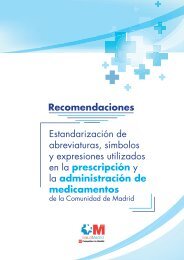lKd7nD
lKd7nD
lKd7nD
You also want an ePaper? Increase the reach of your titles
YUMPU automatically turns print PDFs into web optimized ePapers that Google loves.
the only way to learn about<br />
writing. What is the closest<br />
reading you can give a<br />
poem Translation, of course.<br />
Translation made me discover<br />
not only the depth of the<br />
poem and the difficulties of<br />
the original language but also<br />
the complexities, difficulties,<br />
limits, and resources of the<br />
so-called “target” language,<br />
the one you translate into. For<br />
a young poet translation can<br />
thus be an incredible learning<br />
experience in terms of poetics:<br />
how does the great poet I am<br />
translating do the job—how<br />
does she put the words of her<br />
poem together—and thus,<br />
what can I learn from this act<br />
The first thing one<br />
learns from such attention<br />
is something about the<br />
constructedness of a poem,<br />
something that Stéphane<br />
Mallarmé and William Carlos<br />
Williams insisted on, namely<br />
that a poem is a machine made<br />
of words, and that when using<br />
a different set of construction<br />
elements—words in a different<br />
language—we are likely to get<br />
a different object. And if we<br />
kick that realization up one<br />
level of abstraction, we realize<br />
that there is no “natural”<br />
language, that no words fit the<br />
things in the world perfectly,<br />
that no language adheres to the<br />
world unambiguously, without<br />
remainder, that between word<br />
and world there is always<br />
slippage—enough slippage to<br />
make thousands of languages<br />
My Recommendations<br />
The Odyssey by Homer, translated<br />
from the Ancient Greek by<br />
Charles Stein.<br />
Finally a translation (semantically<br />
accurate and orally—it was an<br />
oral epic, after all!—exciting)<br />
that arises from a very<br />
acute and accurate sense of<br />
contemporary American poetics<br />
and not from an academic<br />
estimation of what Homer may<br />
have or should have sounded like.<br />
The Complete Poetry by César<br />
Vallejo, translated from the<br />
Spanish by Clayton Eshleman.<br />
Eshleman has consistently been<br />
our best Vallejo translator, the<br />
only one to have spent a lifetime<br />
working and reworking maybe the<br />
most complex oeuvre of 20thcentury<br />
Latin-American poetry.<br />
A Passenger from the West by<br />
Nabile Farès, translated from the<br />
French by Peter Thompson.<br />
Full disclosure: I was asked to<br />
write the introduction to this<br />
book by the great Algerian<br />
novelist/poet, which I did<br />
with great pleasure given the<br />
excellence and intelligence of the<br />
work and the translation.<br />
The Art of Empathy: Celebrating Literature in Translation<br />
67



